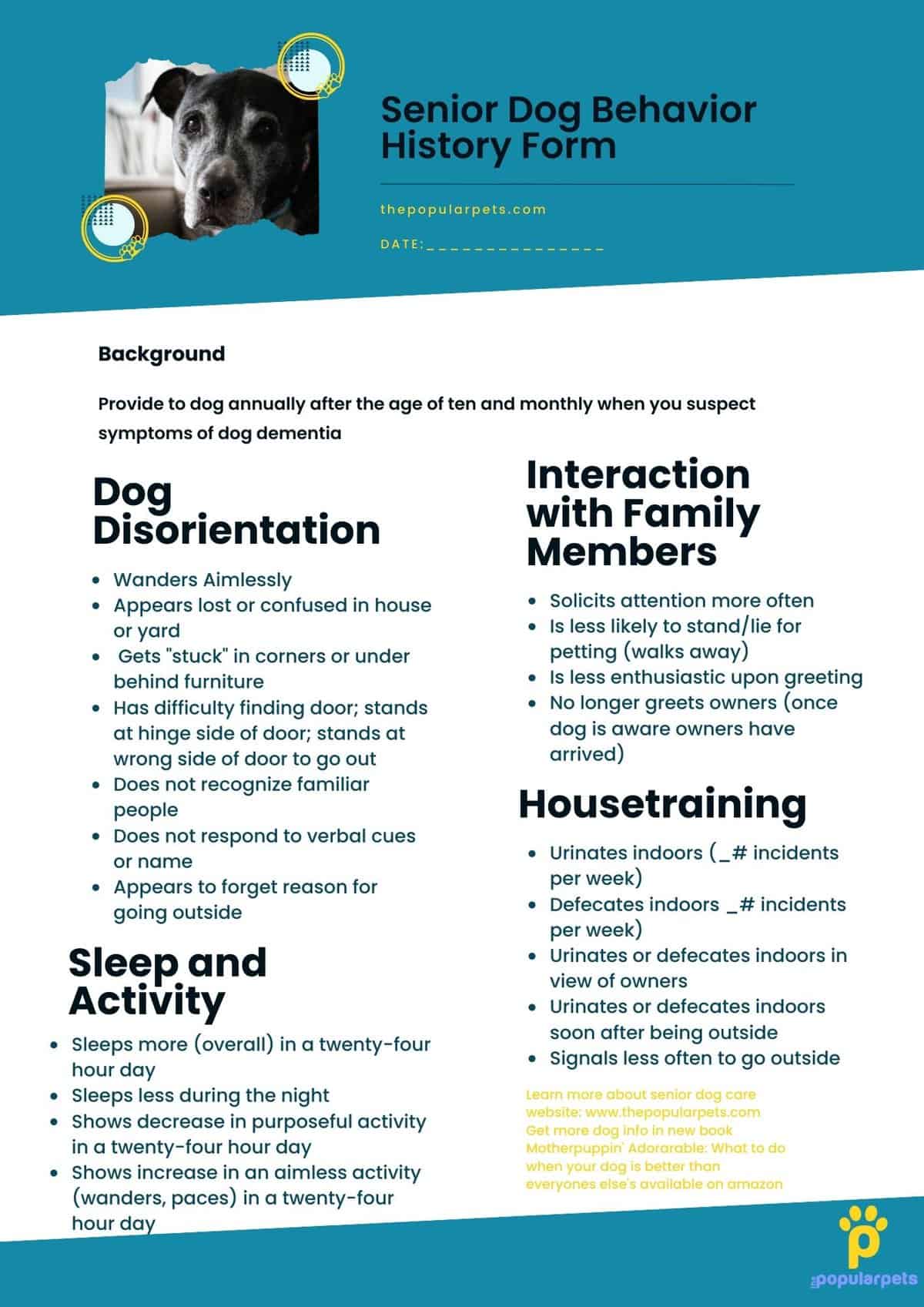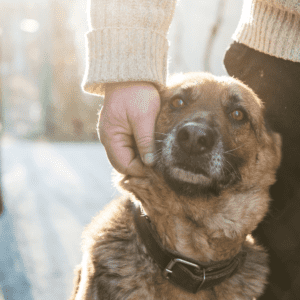We may have lived with a loved one with dementia or Alzheimer’s disease and noted a rapid cognitive decline but our dogs may not suddenly forget names, forget where they are or eat dinner twice. Therefore it is even more difficult to identify and then manage dog dementia referred to as Cognitive Canine Dysfunction.

Even successful agers (older dogs and older humans) lose some mental agility as time passes, according to the vets at Tufts University in Good Old Dog, my favorite senior dog care resource
A gradual reduction in brain size and the loss of more neurons year by year means cognitive dexterity slows down so identifying the signs of dementia and treating dog dementia can be a bit of a trick and more of a process of elimination of other issues says the Vets at Tufts.
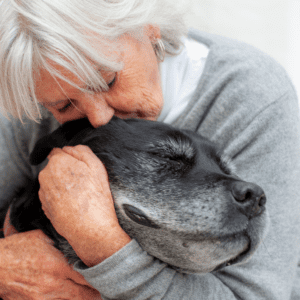
Identifying dementia in dogs is a process of elimination say the Vet’s at Tufts University
But first we need to start at the beginning.
What is Dog Dementia?
Dog dementia or canine cognitive decline or Canine Cognitive Dysfunction (CCD), is a cognitive disorder in dogs associated with effects similar to those of Alzheimer’s in humans. The condition related to the aging of a dogs brain and reduced cognitive function is facilitated by a list with the Acronym DISH, Disorientation, alterations with the way your dogs Interacts with family members, Sleep and activity disturbances, and House soiling. There are more categories that may occur as the brain ages including increased anxiety, altered response to stimuli, drop offs in learning and memory and more.
In general, dog dementia diagnosis is driven by symptomatic behavior and eliminating other issues which could be the cause for certain behaviors later in life.
Can My Dog Get Dementia?
Yes, your dog can get dementia. The trajectory of dog dementia is very similar to Alzheimer’s disease in people. The older a person is the more likely they are to get Alzheimer’s disease, similarly, an estimated 19 percent of dogs eleven to twelve years old have canine cognitive dysfunction; for dogs fifteen to sixteen, the amount increases to forty seven percent say the vets in Good Old Dog. This research does not distinguish by breed or characteristics
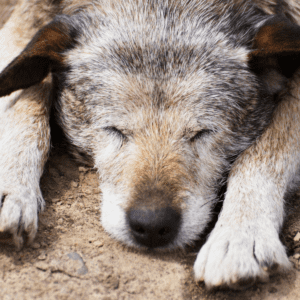
As a dog lover you may have to manage symptoms of dementia in your older dog
Given these statistics it is likely that as a dog lover you may to manage symptoms of cognitive decline at some point in your dogs life.
Dog Dementia Signs – Dog Dementia Symptoms
DISH provides some helpful guidance to assess clinical signs and early diagnosis of Alzheimer’s Disease in the human brain there is also a DISH version for veterinarians which the authors of Good Old Dog compiled so as to be more pet owner friendly. They suggest that you perform these checks annually in elderly dogs over the age of ten years to track cognitive changes or more often if you suspect dog dementia. Find the complete Health Assessment Form for Download here.

Does my 16 year old Zooey have dementia or due to her failing senses is she simply confused?
Dog dementia and canine cognitive dysfunction are tricky. My 16 year old mixed breed, Zooey, seems absolutely together and without any issues and then I will catch her standing staring at a wall. Is it dementia or due to her failing hearing and sight? Is she unaware of her surroundings?
These are the many things that vets will identify and why, the vets at Tufts University say “a diagnosis of cognitive dysfunction in a dog can never truly be definitive in a clinical sense, with lab tests and so on, but must always be a diagnosis of elimination – eliminating other possibilities for changes in a dog’s behavior upon thorough examination.”
In Good Old Dog, the others tell similar stories of dogs with behavioral changes sleep-wake cycles disrupted like keeping their owners up all night that after many exams and looking at environmental factors determined that the elder dog had a noise phobia.
Issues like geriatric separation anxiety (see our articles on Separation Anxiety and What to do if your Senior Dog is Getting Restless at Night) and generalized pain or pain associated with an undetected cancer can be an issue as well since pain seems to throb more at night, even so that in cancer patients protocols are specifically developed to treat night time pain.
Ultimately reviewing the dog dementia signs and dog dementia symptoms are necessary and can tell us a lot about our furry friends, but all health factors especially of old dogs need to be considered by pet parents with your vet to get to the correct diagnosis and potentially enjoy more of the senior years with your dog.
Dog Dementia Symptoms Senior Dog History Form
When you do suspect that there are issues of dog dementia or you would like to take your dog to the vet you should be ready to answer all of the questions in the complete Senior Dog Behavior History form (download full copy here).
If you complete the Senior Dog Behavior History Form your vet can get a complete understanding of all of the issues and you will have the answers to your vets questions at hand. Additionally, you will be able to catch health issues in early stages.
Vets also make the point that the drop off in expected dog behavior is often fairly precipitous. Within months your dog may be acting much differently than she had been over the course of several years. Which can distinguish dementia from regular aging.
There are four main categories in the Dog Behavior History Form that dog owners can review to assess common symptoms of canine cognitive dysfunction syndrome:
1) Dog Disorientation
- Wanders Aimlessly Appears lost or confused in house or yard
- Gets “stuck” in corners or under behind furniture
- Has difficulty finding door; stands at hinge side of door; stands at wrong side of door to go out
- Does not recognize familiar people
- Does not respond to verbal cues or name
- Appears to forget reason for going outside
2) Dog Social Interactions with Family Members
- Solicits attention more often
- Is less likely to stand/lie for petting (walks away)
- Is less enthusiastic upon greeting
- No longer greets owners (once dog is aware owners have arrived)
3) Dog Sleep Patterns and Activity
- Sleeps more (overall) in a twenty-four hour day
- Sleeps less during the night
- Shows decrease in purposeful activity in a twenty-four hour day
- Shows increase in an aimless activity (wanders, paces) in a twenty-four hour day
4) Dog Housetraining
- Urinates indoors (_# incidents per week)
- Defecates indoors _# incidents per week)
- Urinates or defecates indoors in view of owners
- Urinates or defecates indoors soon after being outside
- Signals less often to go outside
Even with this helpful History Form, the Vets at Tufts University still note that making the correct diagnosis can truly be a matter of life and death since many untreated diseases can kill but also since many dogs end up at shelters and pounds for what is perceived to be a cognitive dysfunction when, in fact they have a fixable medical condition.
When at those shelters they will be put down. 20% of dogs brought to shelters are done so because they are “too old” often meaning seemingly demented.
Dog Dementia Treatments – Dog Dementia Supplements
Your vet has now performed a battery of tests and ruled out sensory decline issues, brain tumors, night time phobias, urinary tract infections, pain and many others and has determined that your dog has dog dementia or canine cognitive dysfunction.
The news is hard since your elder dog requires other support and help already and adding dementia on top of it is a bit overwhelming but there are options and your dog, if supported, can still live a very happy and healthy life. The important thing to consider is that dementia is not a doomsday event there are treatment options you can use to keep your dog aging well and healthy.
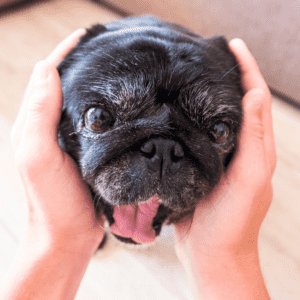
Elder dogs with dementia can still happy, loving lives with their families when supported
Many dogs that show signs of dementia are still sweet and loving and able to appreciate affection and give affection. Natural supplements can support your pet with many issues and there are even pharmaceutical options if you are inclined.
Ultimately, dementia is a tricky disease and symptoms of dementia along with the progression of the disease are so different for each dog that it seems there is no real treatment for dementia but rather treatments for the symptoms of dementia.
Dog Dementia Pharmaceutical Treatments for CCD
Deprenyl needs to be prescribed by your veterinarian and is not natural but it is a pharmaceutical treatment that your vet may prescribe to manage dementia or CCD.
It works by preventing the breakdown in the brain of a neurotransmitter called dopamine which facilitates the connection between thought and action says the authors of Good Old Dog. If your dog has a dementia or CCD diagnosis you can speak to your vet about the pros and cons of pharmaceutical treatments like Deprenly.
Natural Dog Dementia Treatments for CCD
There are many natural ways to support your dog with symptoms of dementia and making your dog’s quality of life better.
1) Supplements to slow cognitive decline in dogs
Many supplements get marketed to dog parents for themselves and their pets that are said to slow the process of aging. These, along with antioxidants, include
Coenzyme Q10 an antioxidant that your body produces naturally. Your cells use CoQ10 for growth and maintenance.
Ginseng, Most ginseng studies have used Panax ginseng (Asian ginseng). There is some evidence that Panax ginseng may, Help boost the immune system, Reduce the risk of cancer, Improve mental performance and well being
Gingko Bilboa where research on ginkgo focuses on its effect on dementia, memory and pain caused by too little blood flow (claudication).
Recent research has shown that oxidative damage to brain cells have a negative impact on advancement of cognitive decline therefore it follows that antioxidants that slow damages to cells caused by environmental factors would support brain health.
Additionally, cell health results is important as messages get sent through cell membranes and essential fatty acids omega 3 fatty acids (see our article on Can I Feed My Dog Sardines), Lipoic Acid, and L-Carnitine also support cell health with positive effects on brain health.
2) Supplements to Support Behavior and Symptoms Associated with Dog Dementia
As we see from the checklist there are so many symptoms of dog dementia that can be disruptive to families and cause issues for your dog that get worse in correlation to the disease progression including anxiety, aggressive behavior, waking in the middle of the night, separation anxiety that seem to stem from confusion and cognitive decline.
Calm CBD Hemp spray may support your dog with some of these issues although it is certainly not a cure for any disease many pet owners have found that it can be quite calming to a senior dog. My 16 year old dog, Zooey, often gets confused and pants or gets nervous and wants to be very close to me that is not characteristic. Calm seems to keep her quiet and far happier (Read more about Zooey and CBD here).

Calm and Relieve Plus Hemp Spray can be helpful for dogs
I have also noticed that her regular stress and confusion seems exacerbated if she has a more active day (most often than not when she has refused to stay home and followed me on a hike). This may be due to joint pain that is made worse by her confusion. I find that Relieve Plus CBD hemp spray also has a calming effect in such instances since it seems to make her more comfortable.
Can you Prevent Dog Dementia?
There does not seem any way to prevent dog dementia, like with human dementia. However, you can take comfort that research is progressing and there are several things that we can do support our dogs and keep their brains active with mental stimulation in their later years by giving our dogs new challenges that will help them retain their cognitive abilities like tricks, new environments, and maybe even a new pack member.
Here are a few tips from the vets at Tufts University that we talk more about in our article on Curbing Cognitive Decline.
1) Teach your dog new tricks to keep the neurons firing.
2) Shuffle your dogs geography, new smells and senses will keep the brain working.
3) Off leash play. Off leash play allows your dog to use its natural predatory instincts to keep the brain active.
4) Get a second dog. A younger wife has been known to keep a man young and a younger dogs may do that as well. Be certain your dog’s stage of life will work with this idea as it has its benefits but not for all dogs.
Dog Dementia Euthanasia
You may be wondering if your dog may be better off without such confusion and whether you should release your dog from life. This is a difficult question that many dog owners must face with their beloved senior dog. It is a weighty responsibility and no clear rules for guidance exist. Something like dementia is even more tough as your dog may be perfectly happy most of the time.
Releasing your dog from life is a miserable decision and miserable to have to make but your beloved senior dog’s vet will be there to support you and guide you with your dog’s best interest at the top and the right time.
The life expectancy of a senior dog with dementia may live many happy years with good care but if the disease leaves her isolated in the disease your vet is there to support you.
Conclusion
Dog dementia is difficult and there are many facets to consider with the care of your dog. Ultimately, there are ways to make your dog comfortable and support him in his life and always. Early detection is important. Download the free Dog Health Assessment Form to detect changes in your dogs cognitive functions early.


